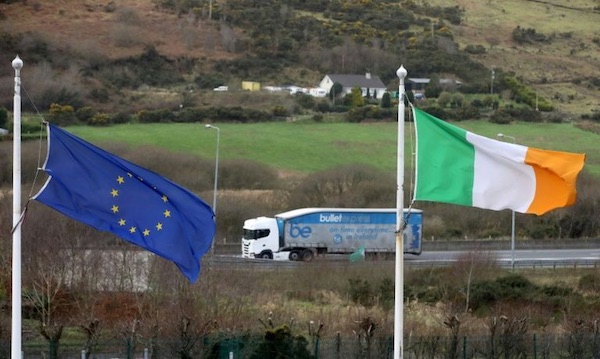
The Dublin government is being urged to help facilitate the increasing reality of Irish unity following the end of the Brexit transition period and the creation of an Irish Sea border.
There have been disruptions to trade as the north of Ireland left the European Union on December 31, while retaining a special status within the EU Customs Union and Single Market.
Some goods from Britain are in short supply in both parts of Ireland as trade routes across the Irish Sea and the English Channel adjusted to new customs checks and other post-Brexit red tape. The ongoing impact of Covid-19 shutdowns has exacerbated the problems.
A small number of lorries have already faced delays at the new border control posts (BCPs) at Larne and Belfast seaports. Among issues discouraging to importers are new checks on food standards and plant and animal health.
Some major companies have stopped or paused deliveries to the north of Ireland. Unionists have called for emergency measures to reverse the changes, at least temporarily, while nationalists have been backing efforts to encourage Irish products and services to fill gaps in the market.
Amid an ongoing economic realignment, new north-south trade deals are being sought to compensate for the decline in east-west trade. In particular, supermarkets and other retailers in the north of Ireland are looking to source goods on the island of Ireland, rather than be forced to import from Britain.
The changes are a step on a bumpy route to an economic united Ireland for which most politicians agree there has been insufficient planning so far.
In a recent paper on the subject, Sinn Féin have said Ireland has the opportunity to take steps to accelerate economic growth in the North for the benefit of the entire island.
They argued that since partition, the border area has been consigned to ‘periphery’ status, limiting its economic potential and dragging down both the Six and 26 Counties.
They called for more coordinated and strategic economic development across the island, and especially within the border region, “thereby attracting more investment, improved productivity, and with it enhanced essential infrastructure.
“In turn, this offers significant economic benefits across the island of Ireland, by way of public revenue returns, overall increases in output, and boosts in higher-skilled employment.”
Sinn Féin President Mary Lou McDonald TD said that now is the time to start planning for the future post-Brexit, and to ensure that there is full support for the sectors that will struggle from the Brexit deal.
“There are many ways that this could be facilitated and we have discussed some of these options with the Irish government,” she said.
“This is not the end of the road. EU leaders have accepted the unique position of Ireland and have agreed that the north will automatically become part of the EU in the context of a United Ireland.
“So we need to start the planning and we need to start talking about a future beyond Brexit.”
Sinn Féin MP Chris Hazzard said the end of the Brexit transition period marked the beginning of planning for a brighter future post-Brexit.
“In the time ahead we all have an existential choice to make once again. Do we want to be bound by this Brexit Britain forever narrowing our vision of the future; or do we want to take a different path, the road back to Europe where we belong?”
Elsewhere, Scottish leaders have been forceful on their post-Brexit ambitions, with plans advanced for a swift return to the EU based on independence.
On the eve of the Brexit deal coming into law, the Scottish nationalist leader at Westminster, Ian Blackford, told English MPs an independent Scotland would fill the seat at the EU vacated by Britain.
And senior Scottish Nationalist MP Joanna Cherry suggested Scotland could achieve freedom from English rule without waiting for a referendum — by following the path of Ireland’s historic election of 1918, when an overwhelming majority of Sinn Féin MPs were returned to Westminster from the entire island.
Ms Cherry was mindful to avoid too direct a comparison, but wrote that the Anglo-Irish Treaty was “in legal and constitutional terms a clear precedent, which shows that a constituent part of the UK can leave and become independent by a process of negotiation after a majority of pro-independence MPs win an election in that constituent part.”
![[Irish Republican News]](https://republican-news.org/graphics/title_gifs/rn.gif)
![[Irish Republican News]](https://republican-news.org/graphics/title_gifs/harp.gif)

